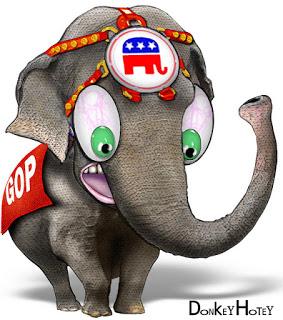 (This caricature of the GOP elephant is by DonkeyHotey.)
(This caricature of the GOP elephant is by DonkeyHotey.)Although Donald Trump tried to put a good face on the 2018 election, the truth was the election's outcome was devastating for the Republican Party. As the Democrats became more diverse, electing more women and minority candidates, the Republican Party became more the party of rich, white, male, ultra-right-wingers.
That meeds to change if they are going to do better in 2020. But they are showing no propensity to make the needed change, and I'm not sure they could change if they wanted. The party's base likes the hate-filled policies of their current president.
Here is just a part of how Paul Waldman describes the GOP's predicament in The Washington Post:
Most of the time, parties don’t have to change after a defeat; all they have to do is wait for circumstances to change. For instance, in 2008 the Republicans suffered terrible losses: Not only was Barack Obama elected president, but also they lost a net of 21 seats in the House and eight in the Senate. They didn’t respond with some kind of ideological reorientation; instead, they just worked to get their base as angry as possible at Obama, which led them to a huge victory and a retaking of the House just two years later.
So it wouldn’t be completely crazy for Republicans to look around and say they’re actually doing pretty well, all things considered, and they just need to be patient. But even for those who don’t agree, there’s not much in the way of an organized force promoting their side of the argument. Have you heard of the Republican Main Street Partnership? Probably not. That’s one of the biggest reasons why a genuine change of course is so hard for Republicans: As a result not only of the recent intensification of polarization but also trends in party membership dating back to the post-civil rights realignment that began in the 1960s, there just aren’t many moderates left in the party to make the case. And the typical Republican in Congress represents a deeply conservative district or state, where the only thing they fear is a primary challenge from their right. After the 2018 election that’s even more true than it was before. Many of the members from swing districts were defeated, leaving the remaining caucus more conservative and less interested in a move to the center. Their voters are also under the influence of an immensely powerful conservative media apparatus whose business model depends on stoking rage and resentment, which further prevents moderates from gaining a foothold. Finally, there’s one gigantic reason Republicans can’t change course: Donald J. Trump. The party is inevitably defined by the president, and this president believes that the only path to political success is feeding the angriest instincts of his base. That’s what he did in 2016, that’s what he did in 2018, and that’s what he’s going to do in 2020. You might have Republican candidates for other offices who try to run more moderate campaigns, but their message will be overwhelmed by what’s coming from the White House. So for at least the next two years, the GOP is going to be exactly what it is now: a party devoted to the interests of the wealthy and large corporations, animated by xenophobia, gripped by climate denial and committed to the maintenance of political division. It might become something else someday, but it certainly won’t in the near future.

